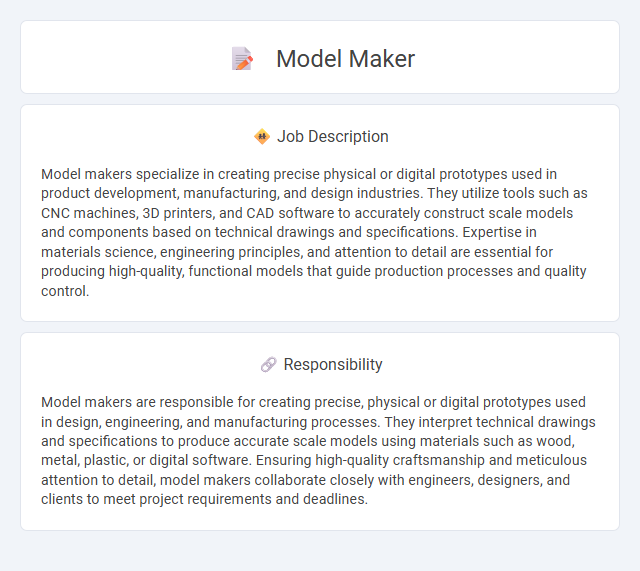
Model makers specialize in creating precise physical or digital prototypes used in product development, manufacturing, and design industries. They utilize tools such as CNC machines, 3D printers, and CAD software to accurately construct scale models and components based on technical drawings and specifications. Expertise in materials science, engineering principles, and attention to detail are essential for producing high-quality, functional models that guide production processes and quality control.
Individuals with strong spatial awareness and attention to detail are likely to be well-suited for a model maker job, as the role often involves creating precise physical or digital representations. People who enjoy hands-on work and have patience for repetitive tasks may find the job satisfying and manageable. However, those who prefer dynamic, social environments or fast-paced work might find this role less compatible with their preferences.
Qualification
A Model Maker must have strong skills in computer-aided design (CAD) software and proficiency in various modeling techniques, including 3D printing and CNC machining. A background in engineering, industrial design, or a related technical field is often required, with attention to detail and precision being critical for creating accurate prototypes and scale models. Experience with materials such as plastics, wood, and metals enhances a Model Maker's ability to produce high-quality physical models for testing and presentation purposes.
Responsibility
Model makers are responsible for creating precise, physical or digital prototypes used in design, engineering, and manufacturing processes. They interpret technical drawings and specifications to produce accurate scale models using materials such as wood, metal, plastic, or digital software. Ensuring high-quality craftsmanship and meticulous attention to detail, model makers collaborate closely with engineers, designers, and clients to meet project requirements and deadlines.
Benefit
Model maker jobs likely offer significant benefits including the development of advanced technical skills and creative problem-solving abilities. Employees might gain opportunities for career growth in industries such as manufacturing, engineering, and entertainment. Access to hands-on experience with cutting-edge tools and technologies could further enhance job satisfaction and professional value.
Challenge
The model maker job probably presents a variety of challenges, including the need to interpret complex designs accurately and produce precise physical prototypes. Navigating tight deadlines and adapting to evolving project requirements may also test problem-solving skills. Success in this role likely depends on a high level of attention to detail and the ability to troubleshoot issues during the model creation process.
Career Advancement
Model maker jobs offer significant opportunities for career advancement through mastering advanced 3D modeling software and gaining expertise in materials and prototyping techniques. Progression often leads to roles such as senior model maker, design engineer, or project manager, where leadership and innovative problem-solving skills are essential. Continuous learning and hands-on experience in industries like manufacturing, aerospace, and automotive enhance prospects for promotion and specialization.
 kuljobs.com
kuljobs.com